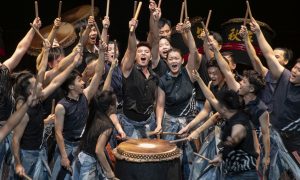This post was written by Elizabeth Perry
Malaysia is a place where food is so tightly wound up in culture, that a meal is always an educational as well as filling experience. No cultural group has more traditional dishes than the Chinese, and it is during Chinese New Year that most of us come into contact with the festive food that is trotted out year in year out for so much more than eating enjoyment. These ingredients, these dishes, and the way in which they are prepared have special meaning, and are an important way of ensuring that the New Year will be a good one.
One of the integral components of any Chinese New Year meal is the yee sang, and while expats will no doubt have seen these colourful salads advertised everywhere, not everyone understands the significance of this messy food, or indeed how important it is to Malaysia.
The yee sang is, quite simply, a raw fish salad, and its earliest origins can be traced back to the Southern Song Dynasty in China (1127-1279). Like many of the foods we enjoy today, it made its way to Malaya (as it was then known) via Chinese migrants, but it wasn’t until the 1960s when someone decided that it would be a great way to celebrate Chinese New Year, and it became such a firm staple of the season.
Quite who made that decision is a bone of contention – Malaysians like to think it is theirs, while Singaporeans lay claim to beginning the tradition – but either way, the yee sang is now an integral part of Chinese New Year eating in these two countries exclusively; nowhere else in the world placing such an important emphasis on this fun appetizer.
And it is a lot of fun, especially for those of us who are used to being squawked at by parents if we do anything but eat our food neatly and quietly. At the beginning of the meal, a waiter brings to the table a huge dish of shredded vegetables in a rainbow of colours – ingredients include radish, carrot, red peppers, and pickled ginger – along with a plate of raw fish (usually salmon) and various other condiments.
Nearly every single thing on the plate has significance – the crushed peanuts that are added by the waiter send wishes for a household full of gold and silver, while the sesame seeds that follow are for a flourishing business. Deep-fried crackers are also added, before a sweet plum sauce is drizzled on.
Once all the ingredients are in place, guests scramble to their feet, chopsticks in hand, and get stuck in to mixing the salad as noisily and as high as they can! .is is not just an excuse to be raucous: it is thought that the higher the mixing, the more money will be made in the new year, and as the group mix they will shout auspicious wishes to one another.
The importance comes from the name: yee sang, which comes from the word yusheng. The literal translation is raw fish, but yusheng sounds very similar to a word that means abundance. .e sound of words is very important in Chinese superstition – the number four is considered bad because it sounds like the word for death – and thus the yee sang is deemed vital to bring the hoped for luckand abundance in the new year, plus it’s a lot of fun too!
Many restaurants and hotels will be offering yee sang this year – whether it is part of a set meal or one its own – and, as is always the way with a competitive environment, there are many creative spins on the old favourite to tempt customers. A fruity yee sang can sometimes be seen, while one hotel offered a Cesar salad version last year, complete with croutons and parmesan cheese. Presentation can become elaborate too, and one hotel in Petaling Jaya was known for its painstakingly prepared yee sang that resembled a dragon for last year’s celebration; it took hours to create and minutes to demolish, costing guests nearly RM900.
You don’t, however, have to spend a fortune to get a taste of this auspicious food this month, and if you have never tried it before, why not take the opportunity to play with your food in the name of luck and money?
———————————————————————————————————
Source: The Expat February 2013
Read More:
- A Satisfying Chinese New Year Feast at West Lake Garden
- Lunch at the Three Little Pigs & The Big Bad Wolf Proves to be Yummy!
- A Charming Italian Restaurant in Kuala Lumpur
What are your thoughts on this article? Let us know by commenting below.No registration needed.

















